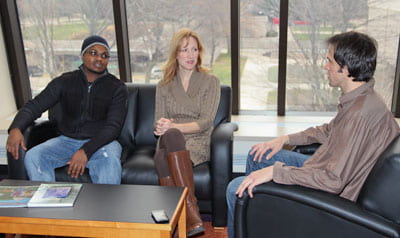Human Biology prof pilots new strategy vs. ‘achievement gap’
 Biology Prof. Angela Bauer was troubled by a pattern she had seen in her Introduction to Human Biology classes.
Biology Prof. Angela Bauer was troubled by a pattern she had seen in her Introduction to Human Biology classes.
Even among students with similar academic preparedness, Caucasian students outperformed multicultural students by a significant margin. Bauer set out to close the “achievement gap.”
“Given that the students had similar high school GPA and ACT scores, we assumed it was something in the classroom dynamic or facilitation that could be improved to close that gap,” Bauer said.
She worked with adviser Shawn Robinson of the American Intercultural Center to encourage multicultural students to take part in a weekly workshop called Targeted Opportunities for Success in the Sciences (TOSS). TOSS sessions are led by students who are trained in both the course material and culturally responsive approaches to teaching. Juny Lee, a graduate student at the time, stepped forward to become the program’s first student leader and teaching assistant.
The outcome over two years has been remarkable.

“The gap is gone,” reported Bauer (above with tutors Benn Mwai, left, and Jesse Cahill). “Although it is difficult to evaluate We believe that it has less to do with content and more to do with engaging students in ways we can’t in large lecture halls. We believe it has to do with the connections to their peers and shared experiences and perhaps a fading of a perceived social barrier between themselves and their teachers.”
Bauer said that the location of the study groups — conducted on the fourth floor of the Laboratory Sciences building where science faculty members have open hours and appear more accessible — has also seemed to foster a comfort level for students. More of the TOSS students are choosing these areas for study and hanging out. And Bauer has noticed an additional outcome — more TOSS students are initiating smaller study groups on their own.
Benn Mwai, a senior human biology major, said serving as a tutor and mentor helps him as well.
“What really motivates me is the principle behind TOSS, trying to encourage minorities to look at science as an interesting discipline, not necessarily a hard discipline that is doable by only a few selected individuals,” he says. “Tutoring is also my other way of learning from other people. When most students ask challenging questions, it helps me understand concepts by consulting with professors, studying more about the topic or discussing with the students; the combination of all these challenges motivates me to want to learn more.”
Much of the credit can go to Robinson, who Bauer says is “relentless” about convincing students of the worthiness of TOSS, and Lee, who was earning his master’s degree in UWGB’s Environmental Science and Policy program when he volunteered his time to be the program’s first teaching assistant.
“Among other dynamics for success, Juny discovered that an extensive vocabulary review seemed especially helpful, as some of the TOSS participants may not have learned English as a first language, making it difficult to grasp both casual language differences and also the scientific terminology used by college faculty,” Bauer said.
Bauer acknowledges that similar gaps and predicted outcomes of success are not unique to courses in the sciences. But implementing a TOSS program on a broader scale would take considerable time (perhaps work release for a faculty member) and resources for both those overseeing the program, and those working in it.
“We look for TAs who have been successful themselves in the course, and then we have considerable training ensure that they are equipped with a culturally responsible approach to leading. It’s an extensive process of interviewing, training and overseeing it, but success speaks for itself,” she says.
“TOSS has also taught me to be more organized and time conscious, and it has given me a great opportunity to make lots of friends, too,” said Mwai, who has begun to apply to medical schools for the next step in his goal to work in the medical field.



